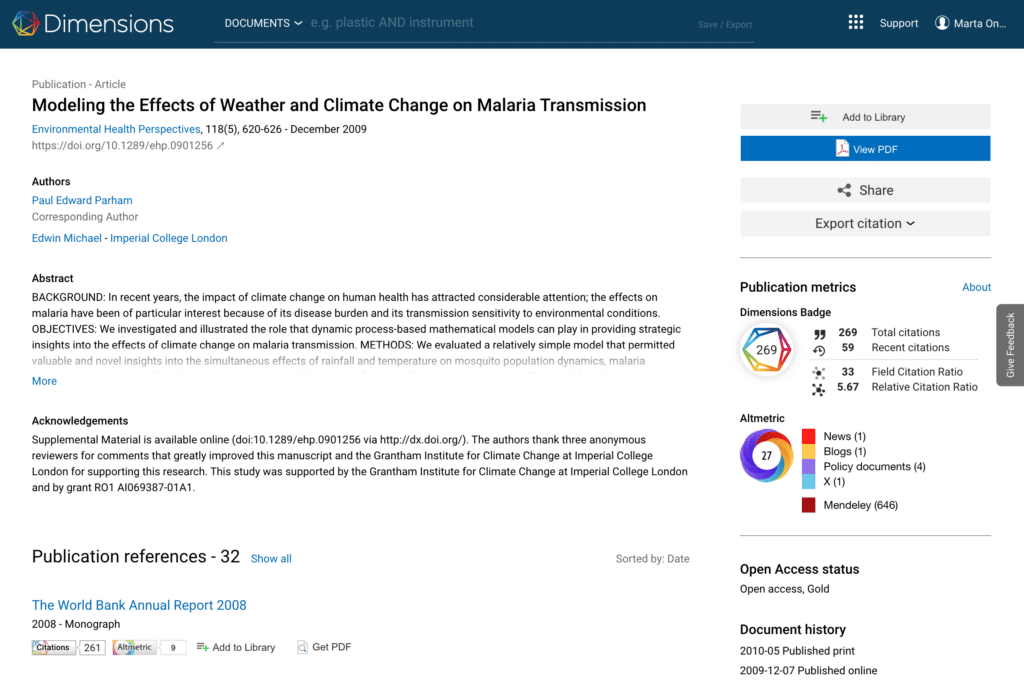Subscribe to our newsletter
Fast forward: a new approach for AI and research
With the launch of Dimensions Research GPT and Dimensions Research GPT Enterprise, researchers the world over now have access to a solution far more powerful than could have been believed just a few years ago. Simon Linacre takes a look at a new solution that combines the scientific evidence base of Dimensions with the pre-eminent Generative AI from ChatGPT.
For many researchers, the ongoing hype around recent developments with Generative AI (GAI) has left them feeling nonplussed, with so many new, unknown solutions for them to use. Added to well-reported questions over hallucinations and responsibly-developed AI, the advantages that GAI could offer have been offset by some of these concerns.
In response, Digital Science has developed its first custom GPT solution, which combines powerful data from Dimensions with ChatGPT’s advanced AI platform; introducing Dimensions Research GPT and Dimensions Research GPT Enterprise.
Dimensions Research GPT’s answers to research queries make use of data from tens of millions of Open Access publications, and access is free to anyone via OpenAI’s GPT Store; Dimensions Research GPT Enterprise provides results underpinned by all publications, grants, clinical trials and patents found within Dimensions and is available to anyone with an organization-wide Dimensions subscription that has ChatGPT enterprise account. Organizations keen to tailor Dimensions Research GPT Enterprise to better meet the needs of specific use cases are also invited to work with our team of experts to define and implement these.
These innovative new research solutions from Dimensions enable users of ChatGPT to discover more precise answers and generative summaries by grounding the GAI response in scientific data – data that comes from millions of publications in Dimensions – through to the increasingly familiar ChatGPT’s conversational interface.
These new solutions have been launched to enable researchers – indeed anyone with an interest in scientific research – to find trusted answers to their questions quickly and easily through a combination of ChatGPT’s infrastructure and Dimensions’ well-regarded research specific capabilities. These new innovations accelerate information discovery, and represent the first of many use cases grounded in AI to come from Digital Science in 2024.
How do they work?
Dimensions Research GPT and Dimensions Research GPT Enterprise are based on Dimensions, the world’s largest collection of linked research data, and supply answers to queries entered by users in OpenAI’s ChatGPT interface. Users can prompt ChatGPT with natural language questions and see AI-generated responses, with notifications each time any content is based on Dimensions data as a result of their queries on the ChatGPT platform, with references shown to the source. These are in the shape of clickable links, which take users directly to the Dimensions platform where they can see pages with further details on the source records to continue their discovery journey.
Key features of Dimensions Research GPT Enterprise include:
- Answers to research queries with publication data, clinical trials, patents and grant information
- Set up in the client’s private environment and only available to client’s end users
- Notifications each time content generated is based on Dimensions data, with references and citation details.

What are the benefits to researchers?
The main benefit for users is that they can find scientifically grounded, inherently improved information on research topics of interest with little time and effort due to the combination of ChatGPT’s interface and Dimensions’ highly regarded research specific capabilities. This will save researchers significant time while also giving them peace of mind by providing easy access to source materials. However, there are a number of additional key benefits for all users in this new innovation:
- Dimensions AI solutions makes ChatGPT research-specific – grounding the answers in facts and providing the user with references to the relevant documents
- It calls on millions of publications to provide information specific and relevant to the query, reducing the risk of hallucination of the generative AI answer while providing an easy route to information validation
- It can help overcome challenges of sheer volume of content available, time-consuming tasks required in research workflows and need for trustworthy AI products.
What’s next with AI and research?
The launch of Dimensions Research GPT and Dimensions Research GPT Enterprise represents Digital Science’s broader commitment to open science and responsible development of AI tools.
These new products are just the latest developments from Digital Science companies that harness the power of AI. In 2023, Dimensions launched a beta version of an AI Assistant, while ReadCube also released a beta version of its AI Assistant last year. Digital Science finished 2023 by completing its acquisition of AI-based academic language service Writefull. And 2024 is likely to see many more AI developments – with some arriving very soon! Dimensions Research GPT and Dimensions Research GPT Enterprise, alongside all Digital Science’s current and future developments with AI, exemplify our commitment to responsible innovation and bringing powerful research solutions to as large an audience as possible. If you haven’t tested ChatGPT yet as part of your research activities, why not give it a go today?

About the Author
Simon Linacre, Head of Content, Brand & Press | Digital Science
Simon has 20 years’ experience in scholarly communications. He has lectured and published on the topics of bibliometrics, publication ethics and research impact, and has recently authored a book on predatory publishing. Simon is an ALPSP tutor and has also served as a COPE Trustee.
